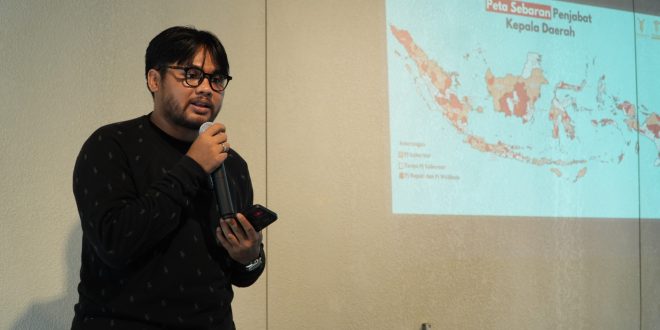The 2024 presidential election has been completed, but it leaves many notes. In its legal considerations, the Constitutional Court (MK) considers that the president supports one of the candidate pairs. In addition, the Constitutional Court views that the distribution of social assistance must also be regulated to minimize the association of government programs with personal interests, especially before the election.
Themis Indonesia Legal Researcher, Hemi Lavour Febrinandez, said that it is likely that the pattern of fraud in the 2024 elections will be followed by the contestants of the 2024 elections, both incumbents who will run again and incumbents who cannot run again but support one of the candidates. According to Lavo, it is important to look at the process of disputing the election results (PHPU) of yesterday’s presidential election, so that the elections run according to the rules.
“In tomorrow’s elections, what needs to be prepared to prevent problems of non-independence from the election organizers is to collect strong evidence directly by the teams of the candidate pairs who will fight,” said Lavo in a discussion on ‘The impact of presidential election fraud on the 2024 elections,’ at the ICW Learning House, South Jakarta (7/5).
Furthermore, Levo noted that during the PHPU Pilpres trial, the petitioners who presented their arguments did not attach enough evidence, so they did not convince the constitutional judges. For example, it was not accompanied by evidence in the form of documents explaining violations of the General Election Commission (KPU) and the Election Supervisory Agency (Bawaslu) related to the nomination of Gibran Rakabuming as a presidential candidate. It is also not accompanied by witness testimony in arguing that the election organizers committed fraud.
“The note is that later in November 2024 candidates can find witnesses who are really able to explain how the fraud occurred at the polling station and can be proven properly,” he explained.
Regarding the misuse and politicization of social assistance, Levo assessed that the arguments postulated were actually supported by evidence so that several judges granted the arguments submitted. However, the standard of proof for judges in PHPU is not enough in the form of social assistance distribution points, it must be accompanied by letters in the form of documents that actually prove the politicization of social assistance.
If you want to prevent the politicization of social assistance, continued Levo, what needs to be done is to audit the distribution of social assistance throughout the five years of social assistance distribution, along with the time and amount distributed. Then analyze the surge in the distribution of social assistance ahead of the regional elections in the area.
In the 2024 simultaneous regional elections on November 27, 2024, 34 provinces and 514 districts/cities will hold elections. Almost all of these regions are currently led by acting regional heads who are directly appointed by the president and the Ministry of Home Affairs (Kemendagri). According to Levo, the acting regional heads have the potential to issue various problematic policies that benefit certain candidate pairs.
“This means that in the implementation of the regional elections, there is the potential that these acting regional heads will use their authority to formulate laws in the form of regional regulations and regional head regulations to rig the 2024 elections,” he said.
The same thing was also conveyed by Indonesia Corruption Watch (ICW) Political Corruption Division Staff Seira Tamara, who highlighted presidential intervention, political dynasties, politicization of state resources, and weak supervision that could potentially also occur in the 2024 elections. This can affect public preferences and make the election contestation unequal. Moreover, the trend of election candidates affiliated with political dynasties continues to increase from year to year.
“In 2005 to 2014, candidates affiliated with political dynasties numbered around 59. Then in the 2015, 2017, and 2018 Pilkada, it increased to 86 candidates and in the 2020 Pilkada the number increased dramatically to 124 candidates,” said Seira.
Another phenomenon that is rampant in the 2024 elections is the politicization of state resources through the use of social assistance inserted with the photos and names of regional heads to build a positive image in the community. Although they have not officially run for office, such actions are considered an initial strategy to run for re-election. This is exacerbated by the weak supervision of the election process, especially in the prosecution of alleged fraud.
Seira said that affiliation to political dynasties in local elections hinders people’s right to get competent candidates. Because it is often easier for candidates supported by political dynasties to run for office even though their competence is not better than other candidates. Seira sees this as the result of the high cost of politics in Indonesia, which has led to political corruption.
“When they take office, what they think about is no longer making policies based on the interests of the community, but how to return the capital that has been spent,” he said.
According to ICW records, there were around 294 regional heads named as suspects in corruption cases from 2010 to 2019. While in the last two years, there have been 61 regional heads who have become suspects in corruption cases. These corrupt practices include bribery, budget misuse and buying and selling of positions used to fund campaigns.
“The impact on the implementation of the elections will be an unbalanced competitive process, the lack of novelty of candidates, ideas, and ideas. As well as hindering the community from getting optimal public services,” he explained.
This potential fraud has a negative impact on public trust in the implementation of elections. The lack of new candidates with fresh ideas due to the dominance of political dynasties hinders the creation of a competent and innovative government. Therefore, strict supervision and reform of the organization of elections are needed to ensure that the elections run honestly and fairly. []
 Rumah Pemilu Indonesia Election Portal
Rumah Pemilu Indonesia Election Portal




